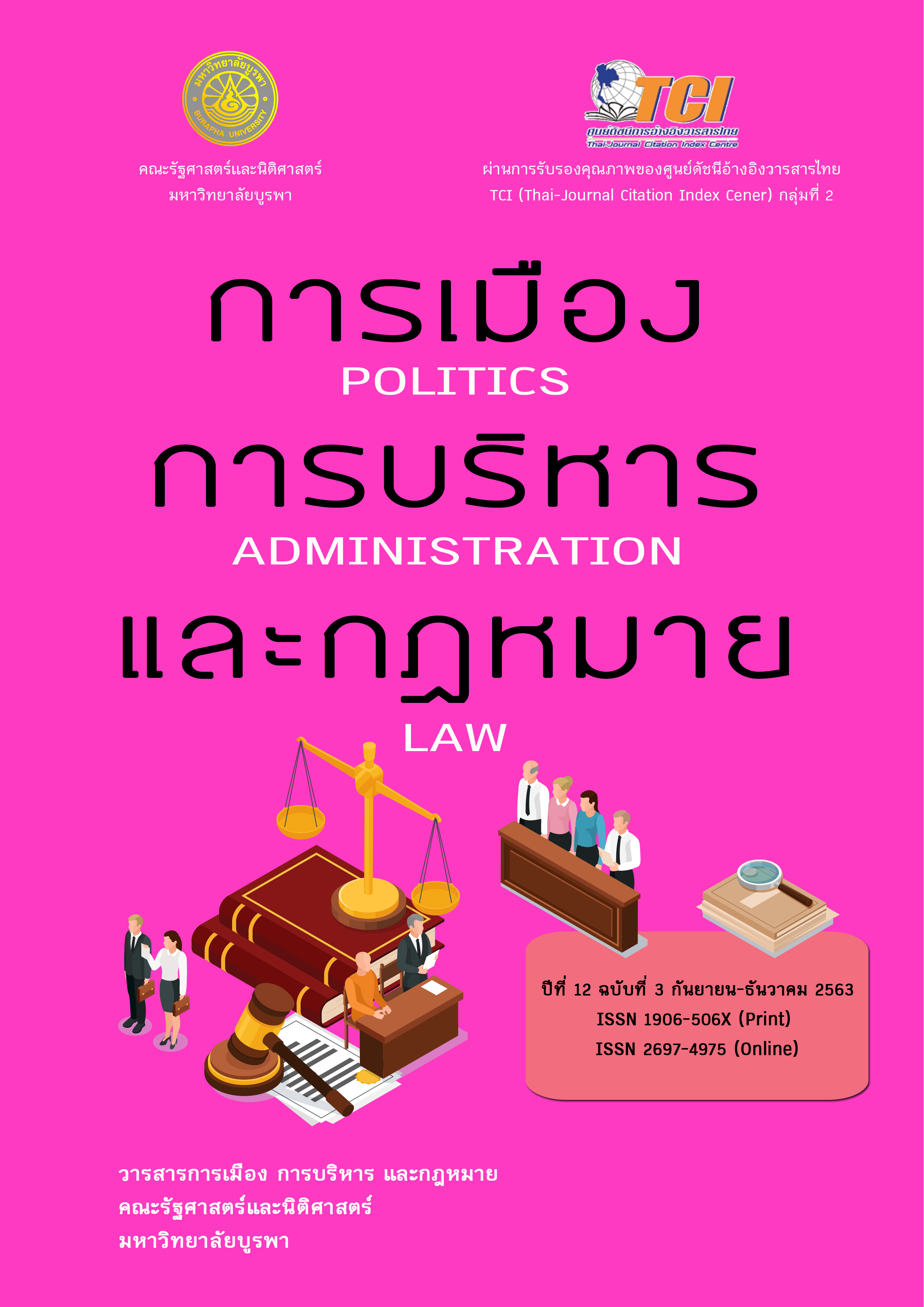การศึกษารูปแบบวิธีการและผลกระทบการเลือกตั้งภายใต้รัฐธรรมนูญใหม่ กรณีศึกษาจังหวัดสระแก้ว
คำสำคัญ:
การเลือกตั้ง, รัฐธรรมนูญใหม่, จังหวัดสระแก้วบทคัดย่อ
งานวิจัยครั้งนี้มีวัตถุประสงค์เพื่อ 1) ศึกษาการเปลี่ยนแปลงของขั้วอำนาจทางการเมือง การย้ายพรรคการเมือง และการตัดสินใจทางการเมืองของผู้สมัครรับเลือกตั้ง 2) ศึกษาพฤติกรรมการใช้เงินในการหาเสียงของผู้สมัครรับเลือกตั้ง 3) ศึกษาความสัมพันธ์ บทบาทของกลุ่มองค์กรที่มีส่วนได้ส่วนเสียกับการเลือกตั้ง และ 4) ศึกษาปัจจัยแวดล้อมที่มีต่อพฤติกรรมทางการเมืองของประชาชน กลุ่มประชากร ได้แก่ ผู้ลงสมัครรับเลือกตั้ง กลุ่มองค์กรภาครัฐและเอกชนที่มีส่วนได้ส่วนเสียต่อการเลือกตั้ง และประชาชนผู้มีสิทธิ์ออกเสียงเลือกตั้งใช้วิธีเลือกกลุ่มตัวอย่างแบบเจาะจงและแบบบังเอิญ เก็บรวบรวมข้อมูลโดยใช้แบบสัมภาษณ์และแบบสอบถาม ผลการวิจัยพบว่า 1) จังหวัดสระแก้วซึ่งแบ่งเขตการเลือกตั้ง 3 เขต ผู้ชนะการเลือกตั้งเป็นสมาชิกสภาผู้แทนราษฎร (ส.ส.) ครั้งก่อน เป็น ส.ส. นามสกุลเดียวกันสังกัดพรรคเพื่อไทยทั้ง 3 เขต แต่การเลือกตั้งครั้งนี้ มีอดีต ส.ส. พรรคเพื่อไทย ย้ายไปสังกัดพรรคพลังประชารัฐ 2 ราย และยังคงสังกัดพรรคเพื่อไทย 1 ราย ปัจจัยของการย้ายพรรควิเคราะห์ได้ 2 แนวทาง คือ มีความขัดแย้งเรื่องอุดมการณ์ทางการเมืองจึงแยกตัวออกมาจากพรรคเดิม หรือเป็นเกมการเมืองเนื่องจากไม่ว่าใครจะเป็นฝ่ายชนะการเลือกตั้งและได้เข้าร่วมรัฐบาลก็จะสามารถรักษาผลประโยชน์ทางธุรกิจ สามารถผลักดันงบประมาณลงมาพัฒนาจังหวัดสระแก้วได้ สำหรับผู้สมัครหน้าใหม่ที่ตัดสินใจลงสมัคร ส.ส. ในครั้งนี้ เนื่องจากเชื่อมั่นในหัวหน้าพรรคและรวมถึงอุดมการณ์ของพรรค ซึ่งหากไม่ชนะการเลือกตั้งก็มีเป้าหมายต่อเนื่องคือการลงสมัครการเมืองระดับท้องถิ่นต่อไป 2) พฤติกรรมการใช้เงินของผู้สมัครรับเลือกตั้งในการทำกิจกรรมหาเสียงจะได้รับการสนับสนุนงบประมาณจากพรรคส่วนหนึ่งและใช้งบประมาณส่วนตัวอีกส่วนหนึ่ง แต่อยู่ในกรอบวงเงินที่กฎหมายกำหนด นอกจากการสนับสนุนงบประมาณที่เป็นตัวเงินมาจากพรรคแล้ว บางพรรคได้มีการจัดวัสดุ อุปกรณ์ เช่น แผ่นพับ โปสเตอร์ มาจากส่วนกลางเพื่อสนับสนุนการดำเนินกิจกรรมการหาเสียงในพื้นที่ 3) ความสัมพันธ์ บทบาทของกลุ่มองค์กรที่มีส่วนได้ส่วนเสียต่อการเลือกตั้ง ได้วางตัวเป็นกลางโดยให้อิสระกับสมาชิกในกลุ่มได้พิจารณาตัดสินใจเลือก ส.ส. อย่างอิสระ เนื่องจากไม่ว่าใครจะเป็นผู้ชนะการเลือกตั้งก็ต้องทำงานประสานความร่วมมือกับ ส.ส. ในพื้นที่ที่ชนะการเลือกตั้งอยู่แล้ว และ 4) ปัจจัยแวดล้อมที่มีอิทธิพลต่อพฤติกรรมการเมืองประชาชนส่วนใหญ่จะเลือกผู้แทนที่ตัวบุคคล สามารถเข้าถึงง่าย ไม่ทิ้งพื้นที่ เป็นที่พึ่งของประชาชนได้ และมองถึงโอกาสของผู้แทนที่จะเลือกเข้าไปมีส่วนร่วมเป็นฝ่ายรัฐบาล ทั้งนี้เนื่องจากจะสามารถผลักดันงบประมาณลงมาพัฒนาจังหวัดสระแก้วให้มีความเจริญทัดเทียมกับจังหวัดใกล้เคียง
เอกสารอ้างอิง
นพรัตน์ วงศ์วิทยาพาณิชย์. (2555). นักการเมืองท้องถิ่นจังหวัดสระแก้ว. กรุงเทพฯ: สำนักวิจัยและพัฒนา สถาบันพระปกเกล้า.
สมเกียรติ วันทะนะ. (2558). ระบอบประชาธิปไตยเปรียบเทียบ. กรุงเทพฯ: สมาคมรัฐศาสตร์แห่งมหาวิทยาลัยเกษตรศาสตร์.
Almond, G. A., & Powell, G. B. (1966). Comparative Politics : A Development Approach. Boston: Little Brown and Company.






